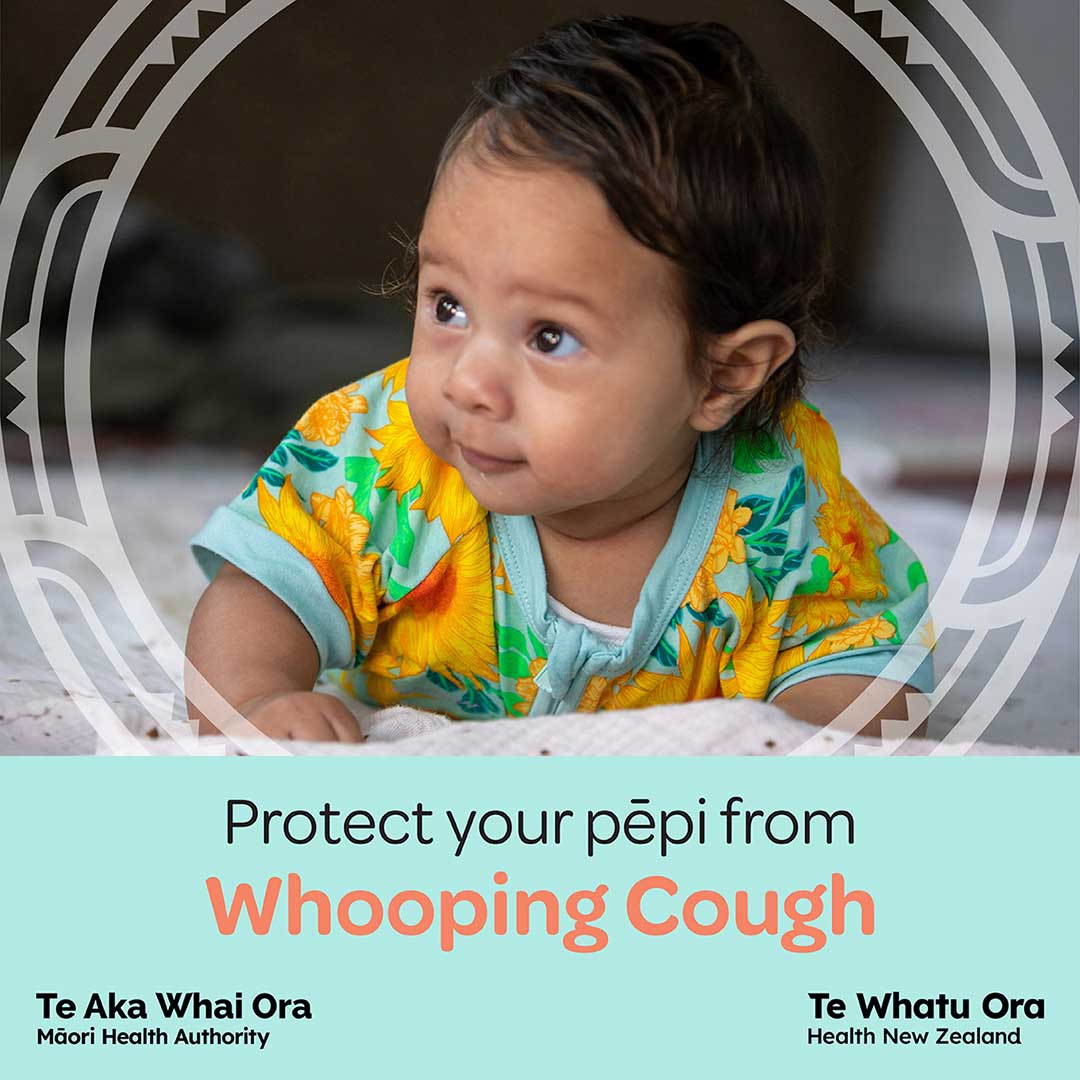Whooping cough
Whooping cough
Make sure you and your aiga are protected against the illness
Whooping cough (pertussis) is a highly infectious disease that is easily spread by coughing and sneezing. It’s a serious infection that causes a long coughing illness, may require hospitalisation and can be life-threatening, especially for young children.
The best protection against whooping cough is to be immunised. It's free for eligible people from GPs, some pharmacies, and Pacific immunisation providers.
- Visit the Ministry of Health - Manatū Hauora for information on how to protect yourself and your aiga from whooping cough.
- Find your local healthcare provider on Healthpoint then enter 'whooping cough' into the search box.
Whooping cough information and resources
Whooping cough can be very serious for babies and children – especially those under one year old. If babies catch whooping cough, they:
- may not be able to feed or breathe properly
- may become so ill they need to go to hospital
- could end up with serious complications such as pneumonia and brain damage.
To protect your baby, get your free immunisation during pregnancy and take your baby for their free immunisations when they’re six weeks, three months, and five months old.
When it’s infectious, people with whooping cough are contagious from six days after exposure to the bacteria, when symptoms are like a normal cold, to three weeks after the ‘whooping’ cough begins – unless they are treated with antibiotics.
Many babies often catch whooping cough from their older siblings or parents before they’re old enough to be vaccinated.
The symptoms of whooping cough usually appear around a week after infection. This delay is known as the incubation period.
The first signs of whooping cough are like a cold, with a blocked or runny nose, sneezing, mild fever, and persistent coughing spasms, often followed by a 'whoop'. This is when you’re most infectious.
After about a week, you or your child:
- will have uncontrollable coughing fits that last for a few minutes and are worse at night
- may make a ‘whoop’ sound when gasping for breath between coughing fits
- may bring up a thick mucus that can make you vomit or choke.
When to see your doctor
See your doctor if you think you or a family member may have whooping cough, particularly if they:
- have prolonged coughing spasms
- turn blue while coughing
- cough with a whooping sound
- are unvaccinated.
When to seek immediate medical advice
You should seek immediate medical advice if:
- you have a baby of 6 months or younger who appears to be very ill
- you (or your child) appear to be experiencing significant breathing difficulties, such as extended periods of breathlessness
- you (or your child) develop serious complications, such as seizures (fits) or pneumonia, an infection that causes inflammation of the tissues in your lungs.
Whooping cough is normally treated with antibiotics at home. The antibiotics will stop you from being infectious after two to five days of taking them.
Try to keep away from other people during this time and keep your child home from school or preschool.
However, without antibiotics, you may still be infectious until three weeks after your intense bouts of coughing start.
Young babies (less than one year old) with whooping cough may need hospital treatment to avoid developing complications.
If your child is admitted to the hospital to be treated for whooping cough, they are normally put into an isolation room. This is to stop the infection from spreading to other patients.
See your doctor
If you think you or a family member may have whooping cough, see your doctor as soon as possible.
Your doctor can test to see whether it is whooping cough.
If it is whooping cough, you may be given antibiotics. It is important that you complete the course of antibiotics to kill all the bacteria.
Your doctor will also tell you how to care for yourself or your child at home while you’re recovering.
If whooping cough is diagnosed in the later stages, it is unlikely that you will be prescribed antibiotics as you will no longer be infectious and they will not improve your symptoms.
Self-care
If you or a family member has whooping cough, try these ideas.
- Warm drinks may be soothing and help break the coughing spasm.
- A humidifier in the bedroom may help (it must be cleaned every two or three days).
- Use saline nose drops to help remove thick mucus.
- Drink lots of clear fluids.
- Keep away from things that trigger coughing, like cigarette smoke, perfumes or pollutants.
Call Healthline on freephone 0800 611 116 if you are unsure what you should do.
Help stop the spread of whooping cough by:
- making sure all your children are up to date with their immunisations
- keeping your baby away from anyone with a cough
- staying away from babies if you have the cough yourself.
If you’ve got a cough that won’t go away, see your doctor.
Immunisation
All babies in Aotearoa New Zealand can be immunised against whooping cough as part of their free childhood immunisations. See the New Zealand Immunisation Schedule.
It’s important to protect babies from whooping cough by getting immunised while you are pregnant, and immunising babies on time – at six weeks, three months and five months old.
The vaccines used are INFANRIX- hexa, INFANRIX-IPV and Boostrix.
Booster doses are given to children when they’re four and 11 years old.
For information on the vaccine, its effectiveness and any risks, visit:

